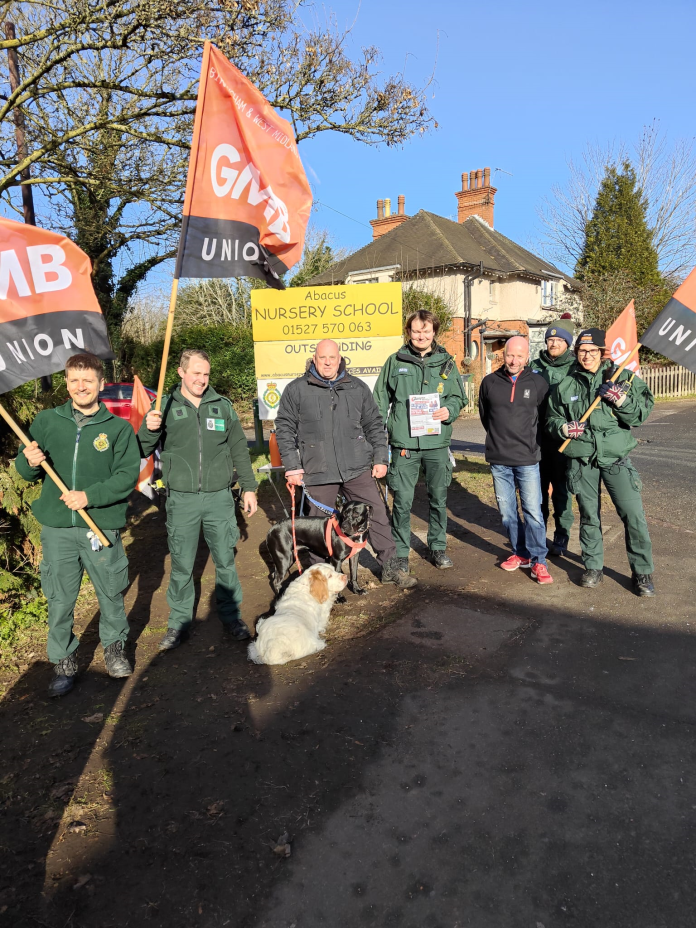Wales – first coordinated ambulance strike is just the start
Gareth Bromhall, Welsh ambulance service worker
20 February saw the first coordinated strike action of ambulance staff unions in Wales. Members of Unite and GMB unions rejected the latest below-inflation pay offer from the Welsh government.
The latest offer would have seen an extra consolidated increase of 1.5% and a 1.5% lump sum from Welsh Labour, on top of the already-imposed pay settlement from the Tories.
This is still far below inflation. And not enough to retain or recruit staff to a collapsing NHS.
The RCN and Unison – the other recognised unions within the Welsh Ambulance Service – are still balloting on the offer. All four unions will have a mandate for strike action if the offer is rejected.
Labour
Welsh Labour health minister, Eluned Morgan, has angered many by chastising Unite members for continuing action, while members voted on the deal. She maintained that the ‘latest offer was the final offer’. She also proclaimed that there was not money available to improve on this year’s award, suggesting next year would be much harsher.
In order for ambulance workers in Wales to win the pay deal we, and the rest of our NHS colleagues, so desperately need, coordinated action is key. 20 February is just the starting point.
Pressure must be kept on the Tories in Westminster. But in Wales, where health is devolved, it’s also essential that we hold Labour to account.
Any suggestion that social partnership – between the Welsh Labour government and the unions in Wales – is successful at present is laughable. Health and education unions find themselves in direct dispute against said ‘partners’!
The fight for better pay and improved conditions is vital. But NHS staff also recognise that this is also the fight for the future of the NHS itself.
NHS workers need to coordinate action together. But also link up with unions in transport, communication, education and the civil service, and build for a 24-hour general strike that many workers now see as necessary. 15 March – Budget Day – is a great opportunity to strike together as a step towards that.
Ambulance workers in GMB and Unite trade unions took strike action in different parts of England and Wales on 17 and 20 February. Welsh ambulance workers in Unite continued their strike to 22 February.
And Northern Ireland ambulance staff are striking too. Socialist Party members – down on the picket lines, supporting the strikes – tell us what’s been said.
Swansea
A Unite union rep, and paramedic for over 20 years, spoke to Socialist Party member Alec Thraves.
“I picked up an elderly gentleman with no family. We spent my whole 12-hour shift outside A&E waiting to offload.
“The next shift, we also waited for 12 hours to offload. The following shift, waited another 12 hours to offload. And this poor man was still there when I started my next shift!
“Over 40 hours in an ambulance, causing misery and pain for our patient, and preventing paramedics doing the essential job we have trained for.”
Mansfield
A striking ambulance worker told Socialist Party member Paul Tooley-Okonkwo: “We are losing money every time we strike. We are doing this for a reason. Our losing out has to mean we get something out of this.”
Birmingham
As with every picket I’ve attended, they all had ideas on how unions could organise the disputes, and how their industries could be run, without PFI privatisation and lack of investment holding them back.
These workers are focused on their dispute and getting rid of Tories, but definitely sympathetic to the need for a new workers’ party, if Labour can’t come up with solutions.
Joe Foster







